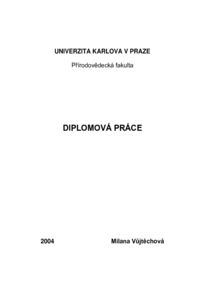Obranné peptidasové inhibitory rostlin: analýza procesu indukce a mechanismu aktivace
Protease inhibitors defense plant: The analysis of process induction and activation
rigorous thesis (RECOGNIZED)

View/
Permanent link
http://hdl.handle.net/20.500.11956/25624Identifiers
Study Information System: 98016
CU Caralogue: 990012933650106986
Collections
- Kvalifikační práce [20869]
Author
Faculty / Institute
Faculty of Science
Discipline
Biochemistry
Department
Department of Biochemistry
Date of defense
12. 1. 2010
Publisher
Univerzita Karlova, Přírodovědecká fakultaLanguage
Czech
Grade
Recognized
Obranné peptidasové inhibitory rostlin: Analýza procesu indukce a mechanismu aktivace Abstract Trypsinové proteázové inhibitory (TPIs) obsažené v divokém tabáku Nicotiana attenuata jsou hlavními obrannými látkami, jejichž obsah se výrazně zvyšuje po napadení rostliny hmyzem nebo působením fytohormonu methyljasmonátu (MeJA). Pro pochopení procesu indukce TPIs byla charakterizována protoelytická fragmentace a následné uvolnění TPIs z multidoménového prekurzoru v rostlinách s neindukovanou a indukovanou hladinou TPIs. Z listového pletiva byla izolována sada izoinhibitorů trypsinu (molekulová hmota ~6 kD) a následně charakterizována jejich posttranslační modifikace. Přítomnost dvouřetězcové inhibiční domény ukazuje cirkulární uspořádání jednotlivých inhibičních domén (TPI) v prekurzoru. U části MeJA-indukovaných izoinhibitorů byl nalezen odlišný způsob fragmentace na N-konci molekuly. Tato strukturální heterogenita je způsobena rozdílným štěpením spojovacího peptidu, kterým jsou odděleny jednotlivé inhibiční domény v prekurzoru. Pomocí specifických peptidových substrátů (fluorescenčně značené FRET) odvozených z aminokyselinové sekvence spojovacího peptidu byly charakterizovány proteázy způsobující proteolytické štěpení prekurzoru na jednotlivé aktivní izoinhibitory a odštěpení transportní sekvence pro buněčné...
Protease inhibitors defense plant: The analysis of process induction and activation Abstract Trypsin proteinase inhibitors (TPIs) of Nicotiana attenuata are major anti-herbivore defenses that increase dramatically in leaves after attack or methyl jasmonate (MeJA) elicitation. To understand the elicitation process, we characterized the proteolytic fragmentation and release of TPIs from a multidomain precursor by proteases in MeJA- elicited and unelicited plants. A set of ~6 kD TPI peptides were purified from leaves and their posttranslational modifications were characterized. The presence of single-chain and two-chain TPIs suggested a circular TPI precursor. In MeJA-elicited plants, the diversity of TPI structures was greater than that predicted to be encoded by the precursor gene. This elicited structural heterogeneity resulted from differential fragmentation of a linker peptide (LP) that separates the 7-TPI functional domains. With an in vitro FRET assay and synthetic substrates derived from the LP sequence, we characterized proteases involved in both the processing of the TPI precursor and its vacuolar targeting sequence.
